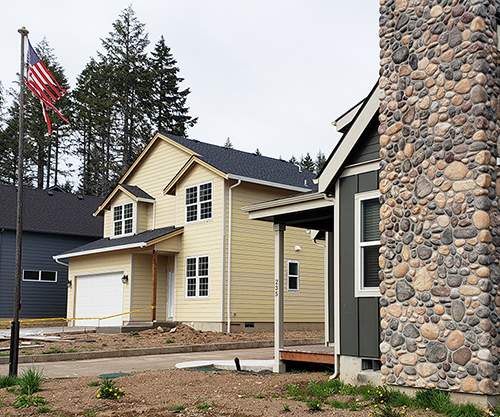Reporter for The Canyon Weekly
PacificCorp is attempting to block community relief groups from spreading word to potential new plaintiffs in a $1.6 billion lawsuit by wildfire survivors, claiming these groups might under-inform or misinform potential litigants.
In an Aug. 15 court filing in Jeanyne James, et al. v. PacifiCorp, the defendants objected to a proposal to use disaster relief and community support organizations to contact those who qualify for damages and inform them of the current class action.
This would occur in addition to more conventional outreach methods, such as legal notices in local newspapers, ads on Google and Facebook, and direct mailing to those living in affected areas. But PacifiCorp argued these other methods were more than sufficient, and using local non-profits might lead to a distortion of information.
“Outsourcing class notice to ‘community organizations’ risks undermining the agreed-upon class notice for little benefit,” said the court filing.
When asked to clarify their characterization of community groups as insufficient for the task of community outreach, a spokesperson for PacifiCorp said it is the company’s policy to not discuss ongoing litigation.
A hearing to consider the issue is scheduled for Sept. 23 before Judge Steffan Alexander in Multnomah County Circuit Court.
Broad class of litigants
The suit was filed Sept. 30, 2020, by survivors of wildfires that destroyed much of the Santiam Canyon earlier that month.
Plaintiffs claim PacifiCorp contributed to the intensity of the fires by failing to properly maintain its equipment and neglecting to de-energize power lines during extreme wildfire conditions, claims which PacifiCorp denies.
A court ruling May 23 extended the class of plaintiffs to include survivors of the Echo Mountain Complex fire in Lincoln County, the South Obenchain fire in Jackson County and the 242 fire in Klamath County, all of which originated or spread rapidly Sept. 7, 2020. But many of these individuals may not know they belong to the class, and outreach efforts must be undertaken to allow them to opt out of the lawsuit if they wish to seek damages on their own.
Plaintiffs hired Seattle-based JND Legal Administration LLC to craft a notification plan, and the firm suggested depending on “key community organizations” for outreach, such as the Oregon Food Bank, Southern Oregon Fire Relief, and the United Way of Oregon. Plaintiffs told the court this method would help ensure the most effective form of outreach, as many wildfire survivors remain displaced but have maintained regular contact with such groups.
Concerns about risk
However, PacifiCorp said these nonprofits might “add their own gloss,” arguing community members who receive notices would inevitably have questions and might turn to the people who provided notification rather than plaintiffs’ attorneys. Because of this, PacifiCorp said involving third parties in notification “risks misinformation with little corresponding benefit” and asked the court to block the use of community groups as an outreach method.
On Aug. 25, a filing by plaintiffs said PacifiCorp’s arguments assume such community groups are either incompetent or would act in bad faith, and said this is a mischaracterization of organizations that have spent the last two years on the front lines of wildfire recovery.
“There is no evidence to support these insinuations or reason to believe that the very same community organizations that have been working with those victimized by the Labor Day 2020 fires are incapable of distributing notice,” said the Aug. 25 filing. “In all likelihood, such organizations will, just as the proposed notice itself does, direct any questions to the case website or to class counsel.”
Plaintiffs also reiterated their argument that, because so many members of the class have not moved back to areas that would be targeted through traditional methods, outreach through community non-profits would be more effective. They also noted JND Legal Administration has successfully employed this method in the past without issue.
Challenge to class status denied
PacifiCorp also objected to the notification plan being finalized until after a pending appeal was resolved in which PacifiCorp challenged class certification itself. On July 8, they asked the Oregon Court of Appeals to reconsider the definition of the class, arguing it was too over-broad and there were potentially too many differences between individual claims and common causes for damages.
However their appeal was rejected as meritless Aug. 25 after court administration determined a ruling in the matter was unlikely to affect the outcome of the case or lead to speedier resolution.
Appellate Commissioner Theresa Kidd said, even if the Appeals Court agreed with PacifiCorp’s argument that individual claims were given too little weight compared to common damages, there was more to defining a plaintiff class than common damages and class certification would not have been hindered.
Outreach outrage
Though a decision on the class notification plan is pending, a local community group has already spoken out against PacifiCorp for casting doubt on the ability of nonprofits to lend a hand.
Cherie Girod, executive director of Canyon Crisis and Resource Center (CCRC), in Mill City, called PacifiCorp’s comments “a crock of crap” and said the real incompetence lies with a company that has failed repeatedly to mitigate wildfire risks.
“What they are saying is not only egregious but lying to cover their butts,” said Girod.
CCRC specializes in helping those impacted by abuse, addiction, homelessness and mental health challenges, which Girod said only intensified after the wildfires. She said they do not insert their own agendas into their outreach, as taking a political stance would violate their 501(c)3 status, and they take seriously any responsibility entrusted to them.
“CCRC would do whatever we can for our struggling communities as long as it does not violate our nonprofit status,” she said.
The Canyon Weekly also sought comment from Santiam Canyon Long Term Recovery Group, a non-profit formed specifically in response to the 2020 wildfires, but had not heard back as of press time. Responses were also still pending for Oregon Food Bank, Southern Oregon Fire Relief, and the United Way of Oregon.




